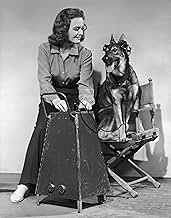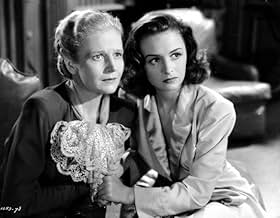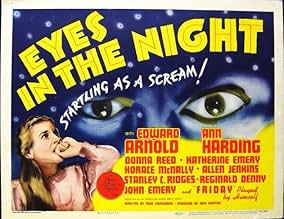IMDb RATING
6.7/10
2.1K
YOUR RATING
A blind detective and his seeing-eye dog investigate a murder and discover a Nazi plot.A blind detective and his seeing-eye dog investigate a murder and discover a Nazi plot.A blind detective and his seeing-eye dog investigate a murder and discover a Nazi plot.
- Director
- Writers
- Stars
Stephen McNally
- Gabriel Hoffman
- (as Horace McNally)
Stanley Ridges
- Hansen
- (as Stanley C. Ridges)
Rosemary DeCamp
- Vera Hoffman
- (as Rosemary de Camp)
Steven Geray
- Anderson
- (as Steve Geray)
John Butler
- Taxicab Driver
- (uncredited)
Edward Kilroy
- Pilot
- (uncredited)
- Director
- Writers
- All cast & crew
- Production, box office & more at IMDbPro
Featured reviews
If you're a dog lover like me, you'll find this one hard not to like! Good old "Friday" steals this show-with some able assistance from a very keen and rugged blind man. I found this one easy to follow and it kept my interest all the way. A really neat mix of intrigue, mystery, and humor to boot. Oh...and some espionage thrown in as is per this era's thematics. The gal who plays the enemy is quite wicked!
This is a murder mystery that will get you smiling! A fun and easy frolic minus a tangled plot that uses all the "senses". Oh, and a young Donna Reed.......not bad at all. This one makes Rin Tin Tin and Lassie look like amateurs!
This is a murder mystery that will get you smiling! A fun and easy frolic minus a tangled plot that uses all the "senses". Oh, and a young Donna Reed.......not bad at all. This one makes Rin Tin Tin and Lassie look like amateurs!
What a gem of a movie! A blind detective, a Nazi plot and the smartest dog I've ever seen all make this a very enjoyable mystery/thriller. Young Donna Reed really is stunning and Mr. Arnold nails it as the blind detective. Great acting all the way around and some plot twists keep you watching. Enjoy it.
Sure, it's pat and simplistic in places and the plot's a little daffy, but it has three major things going for it: an amazing dog named Friday, a delightful performance from veteran Edward Arnold and fine direction by Fred Zinnemann. It could've easily been filler, but Zinnemann has too much respect for his craft and the material to allow that to happen.
As others have pointed out, that dog really is something and nearly steals the show but Arnold is every bit as good. He is particularly amusing in his role within a role where he pretends to be an eccentric, ill-tempered uncle in order to foil the bad guys' dastardly scheme. (And that scheme is a big time McGuffin, no more than an obviously slight excuse to get all the conflicting characters under one roof.) Arnold's Cat & Mouse games with main villains Katherine Emery (resembling Mercedes McCambridge both in looks and delivery) and over-educated "butler" Stanley Ridges are tense and clever.
Zinnemann really shines in one ingenious scene set in a pitch dark basement. Arnold, playing a super smart blind sleuth growls "In the dark! In my kingdom now!" and proceeds to outwit a trigger happy thug. Not unlike the Coen brothers' "Blood Simple" 45 years later, the only light is provided by a number of randomly fired gunshots. Not surprisingly, this technique is effectively taut and unnerving. If you weren't aware who the director was at that point, it's the sort of thing that makes you go running to your film guide thinking "Whoa. Who directed this?"
As others have pointed out, that dog really is something and nearly steals the show but Arnold is every bit as good. He is particularly amusing in his role within a role where he pretends to be an eccentric, ill-tempered uncle in order to foil the bad guys' dastardly scheme. (And that scheme is a big time McGuffin, no more than an obviously slight excuse to get all the conflicting characters under one roof.) Arnold's Cat & Mouse games with main villains Katherine Emery (resembling Mercedes McCambridge both in looks and delivery) and over-educated "butler" Stanley Ridges are tense and clever.
Zinnemann really shines in one ingenious scene set in a pitch dark basement. Arnold, playing a super smart blind sleuth growls "In the dark! In my kingdom now!" and proceeds to outwit a trigger happy thug. Not unlike the Coen brothers' "Blood Simple" 45 years later, the only light is provided by a number of randomly fired gunshots. Not surprisingly, this technique is effectively taut and unnerving. If you weren't aware who the director was at that point, it's the sort of thing that makes you go running to your film guide thinking "Whoa. Who directed this?"
Although Edward Arnold did play some other good guys in his career, it's one that's normally associated with villainy. So he must have looked on with gratitude to MGM for allowing him to play Baynard Kendrick's fictional blind detective Duncan MacLain in two films of which Eyes In The Night is the first. My guess is that if Arnold were an MGM contract player the screen might have seen more of the resourceful Duncan MacLain.
Blindness as it has in a lot of people has forced Duncan MacLain to rely on those remaining senses and has honed his intelligence to a fine edge. He thinks pretty fast on his feet, especially after being hired by Ann Harding gains entrance to her household while she's away by convincing her servants that he's a long lost blind uncle. It's from there he finds out what's going on.
Harding hires Arnold because she's concerned that her step daughter Donna Reed is getting in way over her head with actor John Emery. When Emery turns up dead later that's an understatement.
But when Arnold gets into the household and sees what an interesting group of servants Harding and husband Reginald Denny have, he's thinking that romance might not just be at the bottom of this mystery.
Aided by filmdom's most remarkable dog since Rin Tin Tin in the canine of Friday, MacLain is also aided for strong arm stuff by his driver Allen Jenkins. Although as you will see in the film, Arnold when he gets in close is every bit up to the rough house aspect of the gumshoe profession.
The cast is excellent, especially butler Stanley Ridges who becomes Arnold's opposite number in terms of wit and intelligence. A worthy Moriarty type to Arnold's Holmes.
It's too bad that film never saw more of Duncan MacLain.
Blindness as it has in a lot of people has forced Duncan MacLain to rely on those remaining senses and has honed his intelligence to a fine edge. He thinks pretty fast on his feet, especially after being hired by Ann Harding gains entrance to her household while she's away by convincing her servants that he's a long lost blind uncle. It's from there he finds out what's going on.
Harding hires Arnold because she's concerned that her step daughter Donna Reed is getting in way over her head with actor John Emery. When Emery turns up dead later that's an understatement.
But when Arnold gets into the household and sees what an interesting group of servants Harding and husband Reginald Denny have, he's thinking that romance might not just be at the bottom of this mystery.
Aided by filmdom's most remarkable dog since Rin Tin Tin in the canine of Friday, MacLain is also aided for strong arm stuff by his driver Allen Jenkins. Although as you will see in the film, Arnold when he gets in close is every bit up to the rough house aspect of the gumshoe profession.
The cast is excellent, especially butler Stanley Ridges who becomes Arnold's opposite number in terms of wit and intelligence. A worthy Moriarty type to Arnold's Holmes.
It's too bad that film never saw more of Duncan MacLain.
With an interesting plot, some suspenseful sequences, and a very effective performance by Edward Arnold, "Eyes in the Night" deserves to be much better known. Although its story contained a wartime message, as a whole it rises well above a mere message piece. It has numerous strong points, and not the least of them is director Fred Zinnemann, who scores a success in one of his earlier full-length features.
Arnold heads up a good cast as a blind but very resourceful detective, and he makes the character both interesting and believable. The story gives Arnold a lot of good opportunities, and he makes the most of them. The suspenseful basement sequence could almost have served as a prototype for a similar though much more elaborate sequence in the Audrey Hepburn classic "Wait Until Dark".
Ann Harding, a young Donna Reed, and Reginald Denny are also in the cast, and while they and the other characters cannot compete with Arnold, they all do a solid job. But the standout of the supporting cast is the dog 'Friday', who gets some of the best moments, and who performs very well.
The fast-paced story begins as a murder mystery, but as things slowly become clear, the last half focuses more on espionage and suspense. The story has its less plausible elements, to be sure, but it is all entertaining. It is just as good as a number of other movies from the era that are much better known, and it is well worth the time to watch.
Arnold heads up a good cast as a blind but very resourceful detective, and he makes the character both interesting and believable. The story gives Arnold a lot of good opportunities, and he makes the most of them. The suspenseful basement sequence could almost have served as a prototype for a similar though much more elaborate sequence in the Audrey Hepburn classic "Wait Until Dark".
Ann Harding, a young Donna Reed, and Reginald Denny are also in the cast, and while they and the other characters cannot compete with Arnold, they all do a solid job. But the standout of the supporting cast is the dog 'Friday', who gets some of the best moments, and who performs very well.
The fast-paced story begins as a murder mystery, but as things slowly become clear, the last half focuses more on espionage and suspense. The story has its less plausible elements, to be sure, but it is all entertaining. It is just as good as a number of other movies from the era that are much better known, and it is well worth the time to watch.
Did you know
- TriviaThe first film in what was meant to be to be a mystery franchise focused on blind detective Duncan Maclain who solved murders with the help of his seeing eye dog, Friday. When the second entry, L'oeil caché (1945), failed to elicit sufficient interest, MGM ended the series.
- GoofsWhen the butler/enemy agent Hansen confronts Duncan MacLean loudly playing the organ in the middle of the night, Hansen ruffles his own hair to appear as if he has been sleeping and just awakened - clearly forgetting that MacLean cannot see his appearance.
- Crazy creditsFriday appears as himself.
- Alternate versionsThere is now a colorized version available. Highly recommended as much of the film is set in the dark which doesn't register well in the b&w original.
- ConnectionsFeatured in Personalities (1942)
- How long is Eyes in the Night?Powered by Alexa
Details
Box office
- Budget
- $433,000 (estimated)
- Runtime
- 1h 20m(80 min)
- Color
- Aspect ratio
- 1.37 : 1
Contribute to this page
Suggest an edit or add missing content
































